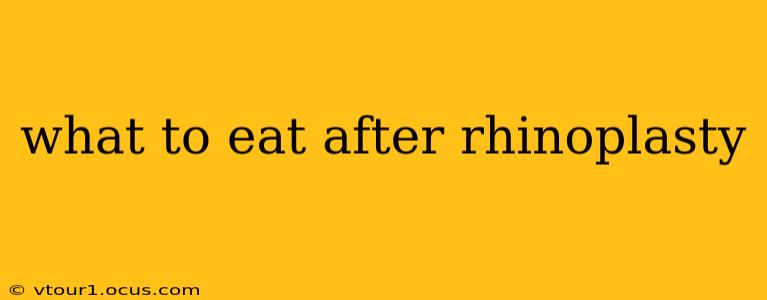Rhinoplasty, or a nose job, is a significant surgical procedure that requires careful post-operative care. While the surgical technique itself is crucial for a successful outcome, your diet plays a surprisingly important role in your healing process and overall comfort. Choosing the right foods can significantly impact swelling, bruising, and your overall recovery time. This guide will explore what to eat after rhinoplasty, focusing on nutrient-rich options that promote healing and minimize discomfort.
What should I eat immediately after rhinoplasty?
The immediate post-operative period (the first 24-48 hours) is critical. You'll likely be experiencing some discomfort and might have a restricted diet as prescribed by your surgeon. Focus on soft, easily digestible foods that require minimal chewing. Think:
- Broths: Chicken broth or vegetable broth are excellent sources of hydration and electrolytes, especially important if you're experiencing nausea or haven't been able to keep down much else.
- Yogurt (plain): Plain yogurt is gentle on the stomach, packed with protein for tissue repair, and rich in probiotics which can aid digestion. Avoid yogurt with added sugar.
- Applesauce: This smooth, easily digestible food provides essential vitamins and fiber without the need for excessive chewing.
- Mashed potatoes: Again, easily chewed and digested, providing carbohydrates for energy. Avoid adding butter or excessive salt initially.
- Scrambled eggs: A good source of protein, but make sure they're very soft and easy to swallow.
What are the best foods to eat during the first week after rhinoplasty?
As you progress through the first week, you can gradually expand your diet, but continue to focus on soft foods that require minimal chewing to avoid putting pressure on your nose. Good options include:
- Oatmeal: A hearty, fiber-rich breakfast option that is easy to digest.
- Smoothies: Blend fruits, vegetables, and yogurt for a nutritious and easy-to-consume meal. Avoid using straws initially.
- Soft cooked vegetables: Steamed or well-cooked carrots, sweet potatoes, and squash are gentle on the digestive system and packed with nutrients.
- Fish: Salmon and other fatty fish are rich in omega-3 fatty acids, which may help reduce inflammation.
- Well-cooked pasta: Choose plain pasta and avoid tomato-based sauces initially.
What foods should I avoid after rhinoplasty?
Certain foods can hinder your recovery and exacerbate swelling or bruising. It's essential to avoid:
- Spicy foods: These can irritate the nasal passages and increase inflammation.
- Acidic foods: Citrus fruits, tomatoes, and vinegar can also contribute to irritation.
- Alcohol: Alcohol can thin the blood and increase bleeding risk, delaying healing.
- Foods that require excessive chewing: Hard candies, nuts, and crunchy foods should be avoided to prevent strain on your nose.
- Salty foods: Excessive salt can lead to fluid retention and increased swelling.
How important is hydration after rhinoplasty?
Hydration is absolutely crucial for a successful recovery. Water helps flush out toxins, reduces swelling, and aids in the healing process. Aim to drink plenty of water throughout the day. Electrolyte drinks can be helpful if you've experienced nausea or vomiting.
What if I experience nausea or vomiting after rhinoplasty?
Nausea and vomiting are common side effects after surgery. If you experience these, stick to clear liquids like broth or ice chips. Small sips of ginger ale can also help soothe the stomach. Contact your surgeon immediately if vomiting persists.
Can my diet affect bruising and swelling after rhinoplasty?
While your surgeon's technique is the primary factor in determining bruising and swelling, your diet plays a supporting role. A diet rich in anti-inflammatory foods, like those mentioned above, can help minimize these side effects. Conversely, foods that promote inflammation can exacerbate them.
What are some additional tips for eating after rhinoplasty?
- Eat small, frequent meals: This is easier on your stomach than large meals.
- Use a straw sparingly (if at all): Avoid using straws for the first few weeks, as sucking can increase pressure on your nose.
- Listen to your body: Pay attention to your body's signals and adjust your diet accordingly. If something causes discomfort, avoid it.
- Consult your surgeon: Always follow your surgeon's specific dietary recommendations.
By carefully considering your diet post-rhinoplasty, you can actively contribute to a smoother and faster recovery. Remember that this information is for general guidance only and should not replace advice from your surgeon. Always follow your surgeon's post-operative instructions, and don't hesitate to contact them with any questions or concerns.
